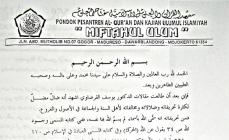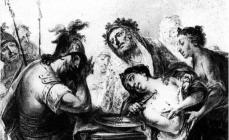The Nantes of Edict - the law granted religious rights to French Protestants. The Edikta edition completed the thirty-year period of religious wars in France and marked the beginning of the century of the relative world, known as''Veliki century'''''''''''''' The Edict was compiled according to the orders of the French king Henry IV and approved in Nantes (April 13, 1598). Canceled by Louis XIV in 1685.
The Nantes of Edict consisted of 93 articles and 36 secret decisions; The latter were not considered by parliaments and are not listed in their protocols. The edition of Huggenov's countless complaints and prolonged negotiations with them were preceded by the publication. No edict of the XVI century in Western Europe provided such extensive tolerance as Nange. Subsequently, he gave reason to blame Huguenotov in the fact that they form a state in the state.
The Nante Edict gave complete equalization of Catholics and Protestants. The first edict article introduced Catholic worship everywhere where it was discontinued. The Catholic clergy returned all its former rights and estates. Calvinism was allowed everywhere where it was before. All the nobles that occupied the highest judicial positions were the right to commit Calvinist worship and to allow unauthorized persons to him. Protestant worship was allowed in the castles of simple nobles, in case the number of Protestants did not exceed 30 people and if the castles were not in the area, where the Catholics owners enjoyed the right of the Supreme Court.
In cities and villages, where Huguenots were allowed to make worship until 1597, this right was restored. Calvinist worship was prohibited formally in Paris and some cities closed for him on the basis and prisoners of surrenders; But Protestants were allowed to live there. In all other places, Huguenotes could have churches, bells, schools, occupy public positions. According to religious reasons, it was prohibited to deprive the relatives of the inheritance, to attack Huguenots and to decline their children to the transition to Catholicism. All sentenced to punish religious beliefs were pardoned.
The Government pledged to help Huguenotes subsidies for schools and churches. At the same time, Huguenotas provided a number of privileges of a political, judicial and military nature: they were allowed to convene periodic meetings (consistory, synodis), to keep deputies at the courtyard for the presentation of stages and complaints through Sully, Morne and D'Nine. In Paris, the Chamber De L'EDIT was established for Protestants of Normandy and Brittany, in the castle - for the Toulouse district, in Bordeaux and Grenoble - Mixed Chambers (Chambers Miparties), for Provence and Burgundy Protestants.
Exiles were returned to their homeland. Gugugotov was left for 8 years of fortresses and fortified castles that belonged to them until 1597 (Places de Sûreté); The garrisons were held here at the expense of the king, and the bosses were subordinate to Huguenotes. The main fortresses were: La Rochelle, Saumour and Montauban. Dad called the Nante Edict is wicked. Huguenotes demanded even more, interpreting the edict in the sense of its expansion of its content.
Henry IV, with a big tact, convinced parliaments to make an edict in his protocols; Only the Renan Parliament persisted until 1609. Combining the edict of a large state seal, Heinrich called him''Vechnical and unwovered'''', guarded him from the wrong interpretations, sometimes restricting it or expanding temporarily, especially in relation to the deadline to the gueaters of fortresses.
This document will be entered into all European history textbooks. In April 1598 (presumably on the 30th), Heinrich IV Bourbon publishes "Edict in favor of those who confess the so-called reformed religion", putting an end to the epoch religious wars between Catholics and Huguenotes Protestants. The consequences of this step for France is difficult to overestimate, although, as it usually happens, the descendants bring their meanings and their sharp. Really, the Nanntian Edict, this king on the century, did not hold out the century. He did not save Huguenot from the take of their outpost - la-rocked by the troops of Cardinal Richelieu, and in 1685 it was completely abolished by no one as the grandson of King Huguenot Louis XIV, who sent more than one hundred thousand French Protestants into exile. Let's get acquainted with this and indeed an extraordinary model of a wise and far-sighted policy of the founder of the Bourbon dynasty, on its skins who experienced the infancy of religious strings. Heinrich moved to Catholicism twice: forced in 1572, barely remaining alive in the massacre of the Bartholomeevian Night, and in 1593, remaining the heir of the French throne after the last Valua. Huguenota never crowned the Catholic Church. Bourbon made a choice in favor of the religion of the majority of the French by saying the historical phrase: "Paris stands Massa."

Original and lists
The document itself, which represented a contract of the crown with Protestants, signed in two copies, was not preserved. Protestant copy was kept in La Rochelle and died in a fire during the tick of the fortress. Royal trail is lost. The edict's text has been preserved in two authentic lists of that era: one, located in the national archive, was made for the Paris Parliament, which after a long prospecting with King Heinrich, ratified it in 1599 in a slightly truncated form. Another copy, more complete, in which today we reconstruct the original of the Nante Edicta, was discovered in the library of the city of Geneva, where many French Protestants were refuge after the cancellation of the edict. The library records did not save the name of the one who handed the scroll to save, allegedly, he appeared in the archive at the beginning of XVII IV. The texts of both lists are not fully identical. There is a difference in the date of signing the edict: in some places it is indicated as April 13, in other places - April 30. According to tradition, Edicts - the legislative acts of the personal will of the monarch did not dated. On both spirits there are different marks, certified by the secretaries and non-notaries of the Kingdom. By the way, the binding of the Edictant to Nangu is true, according to the French site http://www.herodote.net, only "for three quarters": the document was compiled by the team of royal and Protestant negotiators in the city of Anger, the king's bet, from where he led the suppression of the last Catholic The focus of resistance to his focus on the French throne in Brittany, the capital of which at the time was the city of Nantes. Having won the Governor of Brittany Duke de Monkeret rather by the power of the Spirit than the power of weapons, on April 13, Heinrich went to Nantes, where how the triumph was hurried to return the debt to his former uninterests. However, history did not save the details of the Administration of the Edict and, despite the tradition, he was not announced in the Nanntian castle of the Dukes of Breton, as Sources sometimes indicate. Perhaps a document that could not be angry with Catholic Brittany, was signed twich. Moreover, that the second side is those in favor of whom Edict was adopted - in general, they were dissatisfied with them, believing that they deserved from the monarch, who helped in the struggle for the throne, much greater privileges.
Approval of the principle of freedom of conscience
In Internet sources and many popular historical work, they write about "equality" between the Catholics and Huguenotes, proclaimed in the Edic. This is not true. In the first paragraphs declared that Catholicism is the main religion of the French kingdom. Recall that during the entire XVIV century - a century of religious strife - the religion of the local feudal was the religion of the settlement and the province of the province. So, motherland Heinrich IV - Baarn was Protestant, because Henry's mother Jeanne D'Alba was a fierce gugen's and - Queen Navarre. Edict ordered to restore Catholicism throughout where he was "expelled". The persecution of Huguenov was prohibited, but RPR (from Franz. "The so-called reformed religion") was not allowed everywhere. In the five largest cities, including Paris, as if at the yard itself, in the army and folk education, the administration of the Protestant cult was prohibited. This could be done in strictly agreed places and cases: for example, if the senor, holder judicial authorityShe professed RPR, - in his private chapels or temples built on his possessions, in cities and villages, where Protestantism has been confessed publicly until 1580, or in new places that the Bayy of Bayia judicial district could be. In 56 "special" or "secret" edict articles, specific cities and possessions and features of their confessional affiliation were listed.
For justice to go and turned out to be our subject without any addiction, hatred or favor, for it is one of the most important means to maintain peace and consent ...
For the countries sent after almost half-century religious wars, it is important that the Edict begins with the proclamation of an amnesty to all who committed the crime of bloodshed. However, the most important achievement of the Edictory, its principled novelty is the gradual displacement of this territorial confessional principle the principle of personal freedom of conscience. Heinrich was not a bet on religion and not on the origin of a person, but for his utility the country, his dedication to the monarch, personal qualities. Edict cancels the ban of Huguenotes to occupy court and social positions. The king gives an example of the subject: his finant of finance, the engine of economic reforms, the faithful companion Maximilene de Sully - Protestant, who has not changed faith after Bourbon. Protestants get freedom to send a cult in marriage, baptism, burial. Children of families of one religious affiliation forbidden to pay back to another contrary to the will of the parents. Edict prohibits discrimination on religious signs when receiving students to universities and providing services for houses of charity and hospitals for the poor. More than a third of the articles of the Edict regulate legal and judicial practice. Under the Paris Paris, according to the Will of the King, to be established by the "Edicta Chamber" of 16 advisers, where Protestants also receive their places to consider issues in the jurisdiction of the Edic. Finally, two became an integral part of the new law praised diplomas - "On pastors" and "about garrisons." These were personal guarantees of the king to the former uninimens signed before Edikta. To maintain the pastoral corps, the king allocated 45,000 ECU. The gram of garrisons was fixed behind Protestants the so-called "security sites", held by them by the Odict of 1570 (approximately 140 settlements). The costs of their protection and the content of 180,000 ECU also covered its majesty treasury. But after eight years, they had to move to the power of the king. By the way, Louis XIII referred to this, which went to conquer La Rocheli in 1628 according to the law of that time, the monarch was to ratify his edicts in local governments - parliaments. It was not easy for yesterday's humgot. During the year, Heinrich pierced his edict: inclined, persuaded, threatened. But thanks to Edict, Heinrich IV was able to rely on "his Protestants" who threatened to leave the king without support in the case of the announcement of the War of Spain. The first Bourbon finished the war internal and war outside at the same time: after 3 days after the Edikta, the Verven Mir was signed, who stopped the Spanish Catholic intervention. The Grand King was able to begin the peaceful construction of the country in which, as he dreamed, "every peasant on the weekend will have a chicken in SUP."
Lady Century Edikta
Modern historian and politician Pierre Zhoks, a leaving from the Protestant family, argues that the Nanntal Edict has not so much to laid the foundations of religious pluralism, as he opened the way to strengthen and the centralization of royal power. At least, this is how it turned out: both the Son, and the grandson of Heinrich, contrary to the constant chlorination of the first Bourbon, he did their religious policies in the spirit of Nanta. Louis XIII with his powerful first Minister - Cardinal Richelieus won the stronghold of Protestants of La Rochelle. True, we must give them due: the persecution of Huguenov did not resume. But Louis XIV canceled Edict, by force and threats forcing each French Protestant to choose between her beliefs and property, position in society and personal security. It is characteristic that in the preamble to the document that cancels Edict, the grandson of Heinrich IV will write, which makes it ... for the unnecessary of it. After all, the Edict of the Great Grandfather was a transitional measure for the sake of security of the kingdom, security was restored, and all the good subjects had already accepted Catholicism - and "who was not hidden, I am not guilty" ... France has lost about one hundred thousand subjects, some of which, together with their capital, found the shelter in Switzerland, skillfully let down in the appeal of Huggenot money. But Protestantism was not expelled finally. In the middle of the XIX century. Protestants constituted about 22% of the country's population: in addition to the newly attached Elsas, the positions of Calvinism were traditionally strong in the south-west - from Montpellier to Narbonne.
Despite the fact that the good intentions of the Nante Edict in a brief persistence remained rather intentions, it was an unprecedented document, which laid the foundations of the interfaith world and wider - relations between the majority and minority.
Sources: Pierre Joxe. L'Édit de Nantes: Réflexions Pour Un Ploralisme Religieux, Pluriel, Paris 2011 http://www.ville-ge.ch/bge/bibliotheque_numerique/edit-de-nantes.html
The French Republic has always proclaimed the separation of the church and the state. Unlike other european countriesWhere religion is an integral part of the life of political and public, France sought to accept laws guided first of all with secular motives. However, it was not always. Another 400 years ago the Cancellation of the Nante Edic (1685) entailed the cruel repression of Protestants. The possibility of holding such a policy indicates that in the XVII century the church was inseparable from the state. October 18, 1685 Louis Xiv signed Edict Fontainebleau, who forbidden the administration of Protestant rites in the territory of the entire French kingdom. From now on, one single religion became mandatory, the religion that the king himself was confined - Catholicism. Thus, the Nantes of Edict, signed in 1598 was canceled.
Heinrich IV, signing the Nante Edict, freed Protestants from the obligation to visit Catholic services, and also provided the right to have its fortified cities and fortresses and armed army. However, this peacekeeping activities Always considered by the authorities as a temporary measure. In the continuation of the whole XVII century. The status of Protestants has undergone major changes, and their situation has increasingly deteriorated. Since 1626, the conclusion of the world in Alesa, Louis XIII cancels one of the most important articles of the Nantes of the Nange Edicta - permission to create your own army.

Starting from the Board of Louis XIV (meaning his personal board, without regency, which began in 1661), the political and socio-economic situation of Protestants deteriorates. Up until 1685, the Nante Edict officially operates throughout the country, but the fulfillment of its provisions is becoming increasingly difficult, numerous amendments and restrictive conditions are being taken. Between 1661 and 1679. The Royal Council takes about twelve restrictive edicts, which indicates the transition from the policies of tolerance to the present despotism. All these amendments were collected in a kind of anthology, called "Catholic solutions" and published in 1668
The idea that it is necessary to end the reformat religion in France was born not only in the minds of the royal ministers. From the province, mainly from the areas where Protestants were presented the most widely (Nizhny Languedok, Baarn, Seven, Vivar, Dauphine) became increasingly to receive complaints from bishops, interns, parliamentarians in places and simply zealous Catholics on Huguenots, which, according to The local population was striving for the overthrow of royal power. Reformists were accused of all mortal sins: they de bad subjects and want to kill the king (did they execute Karl I in 1649?), They are Republicans and the enemies of the king and the honest people. Of course, all this were fiction, starting from 1629 more than one and a half million Protestants living in France, no power and influence in their own country, they cannot even openly express their opinions in the electoral bodies. "The Huguenot Republic", which was assumed to organize the example of the United Provinces, and remained a dream. The accusations of disloyalty, the gueaters were also groundless, Huguenotes were one of the most loyal supporters of the young Louis XIV during the Front (1648-1653).

In the 80s of the XVII century. Repressions against Protestants are enhanced, as well as against individual dissatisfied in the provinces. Monarchy seeks to absolute their power more and more. Continuing the policy of Richelieu and Maazarini, Louis XIV strive to unify the state structure so that all the alone submitted to the monarch alone and were all one faith. Protestants fitted poorly into such parts. In addition, the king suspected their leaders in intercourse with Protestants of other countries, thinking that they were preparing a rebellion against his own.
Repressions against Huguenots reflect the context of the era. In 1678, a peace treaty signed in Nimegenen, put an end to the Dutch War, in which France opposed a huge Protestant country. Despite the fact that France has lost many previously captured territories, Alsace and Lorraine were transferred to it, as well as other land on the Rhine. All this has strengthened the authority of royal power. In addition, the king has received support from the French clergy in his conflict with Pope Innoent Xi, which unfolds at around the same time. In 1682, the highest church hierarchs created Declaration in four articleswhich proclaimed the independence of the king of France from the papacy. Another document called Pastoral warningin which Protestants were accused of schism.
Now that the king's power was absolute when the Catholic faith was recognized as the only right thing in the state, the accusation of treason was wary than the charge of heresy. Huguenots executed not so much for the fact that they are bad Christians, how much because they did not want to recognize the absolute power of the king, that is, they became the rebels and enemies of the people.
From July 1682 to October 1685 from the Royal Office, eighty-three restrictive declarations concerning Protestants. For example, according to the decree of August 30, 1682, they were forbidden to be gathering together and sing anywhere other than the temples, with the obligatory presence of the pastor. Police was charged to keep track of the execution of this Decree. In parallel, the temples have been destroyed already built by Huguenots.
The victims of the segregation held by the king, the Huguenotes were outlawed in their own country. In August 1683, mixed marriages between Catholics and Huguenotes were prohibited, in October 1685, a decree on classes allowed to Protestants were released. Only agriculture and trade remained from the permitted professions. Protestants, of course, did not remain indifferent witnesses of such an appeal. Everywhere where it is possible, resistance is organized with the help of various means. The main forms of protest were massive hunger strikes and peaceful manifestations. The reaction of the king was only an increase in repression. In Puat in 1681, in Dofine, Sevennas and Nizhny Langadok in 1683, and then in the continuation of 1685-1686. Military position is introduced, which means that the soldiers are housed directly in the houses of Protestants. The mission of the army in this case is to return them to the Lunos of the Catholic Church. Such a policy was called Dragonada, the result of it is several thousand dead and forced flight of 200,000.

In the autumn of 1685, the king receives news that Protestants are massively moving into Catholicism. Now he can officially abolish the Nante Edict, since the need for it disappeared. The country of the King announced the following: "We see that the best and most of our subjects, who called themselves reformats, gladly returned to the Lono of the Catholic Church; From here we assume that the execution of the Nange Edicta becomes useless. "
This legal fiction, nevertheless, was perceived in France, as legitimate and necessary, which again contributed to the growth of the authority of Louis XIV, which now was considered to be a collector of lands and the Catholic monarch. This authority, however, has strengthened only in France. In the neighboring states, the image of the king, on the contrary, swept, which the Protestant refugees who flooded the whole of Europe contributed to the Nimalo. Among the refugees there were many people knowledgeable, artisans and scribes. It was they who let the arrows of sarcasm and criticism towards the French king, comparing him with Nebuchadnezzar. Herod and even with the devil himself.
In 1686 in his work Proceedings of prophecies Pastor Pierre Zhurio predicted the overthrow of the French king, which will follow his decision to defeat Kurpalts (1688-1689). Then, wrote Zhurio, Europe will call Louis to answer. In France itself, voices were also heard against universal Catholization, Vahan in his " Memoirs of Memories Gugugotov"(1689) criticizes the desire of the king to rule the minds, but not bodies."
From 1702 to 1713 Authorities cruelly suppress the uprising of Protestants, which swept Seven. The uprising participants received the name of the craftsis, on white shirts, worn over clothes. However, Louis XIV cannot fully subjugate the Kamizarov, and he is forced to concessions. More and more French see tyrana in it, and not a champion of religion.

Only after a hundred years, Protestants could finally get freedom to confess their religion. She was granted to them in 1789. The french revolution that soon announced and at all declared all religions equal to each other and allowed every citizen to choose her faith to her soul.
The Nante Edict of 1598 is a law signed by French King Heinrich IV on August 13, 1598 in the city of Nantes; In-Ver-sewed Re-Li-Gi-Zh (Gu-Ge-notes) Warves in FRs.
The Nante Edict of Javal-Xia Perla In Pulti-Koi Cow-Da-Da-Dae Da-La-Da-Dan-Dan-Data French Mo-Nari Ni-Si-Si -Who from their Kon-Fes-Sio-Nal-Na-Na-Na-Na-Na-st. Due to the Nanntal Edict, Gene Rih IV Pro-Dol-lived in Li-Ku-Ku Re-Lagiosis at Mi-Rey, which-Rui-Rui-Pesh-Pesh Weight travelers from Di-A-Va Loua (Edik-You Kar-La IX, Gen Ri-Ha III, etc.). The Nantes of Edict OB-Yav-Lied the official re-Li-Hi-her-Lizizism, the WHO Naki-shutting of Ka-Lesic Church-Von Kon-Fi-Basher -The land, but at the same time, the pre-dos-duv-laid the French gu-ge-there, there is a border of Ve-Ro-Is-in-Ve-Dae. In the Nantes of the edict of Dema-Ri-Ri-Vas-Ta-Tan-Tov-Tov on the Ras-A-Eya-St-Vom, Obra-Zo-Va- Nie, the court, medical in power, the nya-Tie state must-but-stey. At the same time, the Nanntian Edict of the OG-Ra-Nich-Chi-Shaft of WHO WHO-NI-ENGLISH RESE-TAN-TA-MI: In the largest Rh-Dah, the EPI-Skop-Ski Den-Den Qi-Yah and their Ok-Re-Stochemes (PA-Riga, Tu-Lu-for, Di-John, Reims, Charter, etc. ) Broi-service would be per capita, but, wherein Special CO-al-Al-WHO-Va-Valos, that under the "OK-RE No-Stew, "Al-Ma-Xia Terr-Riya-Ria from 2 to 5 Lei. On Pro-Talk-Tan-Tov on La-Ga-Elk Oba-Tel-St-in-Po-Chi-Wash de Sia-Ti-well in Paul Gi-Lie-Can-Skoy Church -Vi (see Gal-Lee-Chan), do not work in time in the time of ka-luxury holidays; Sail-Tel-Test-Tant-Tantk Church-Wei (as well as Ka-Lich. Du-Ho-Ven-Art) Os-in-Bo-ft Sustainable services and Ta-flas. For SU-DEB-BY-BY-RA-Routers on De-Lama Pros-Vi-Le-Le-Le-Mi-Wo-Woi Re-Li-Gii Cop-Da-Vassed Special PA-LA-LA-La Men-Tah in Pa-Ri-La, Tu-Lu-Ze, Bor-to and South Nob-Le, Sosh-Yav-Shi-Lo -Well of pro-Ta Tan-Tov. SO-VOK-BUT NANTA EDICTE, IN RO-DAKH, WHERE THE LO ONE-RE-SE-BUT-LE-LE-LEY CULT-TA - Test-Tant-Schco Lies and Aka de Mii (Mont-Bang, Se-Dan, Him, etc.). The EDIK-TA is the important Semi-Reta Stas, pre-Smart Ri-Wav-Shi-Shi-Khi-Ta-Mia for - by Maeh with them from the time of the re-ligiosis wars of GO-RO-Dov-Cre-Stairs and UK-Repe-Lyon-Bed (La Rozhel, Mont-Bang, Mont-Peh, Him, Nyor, etc.), many of the pore-ta-mi. This is a great-in-law for 8 years with WHO WHO WHO-NO-STUE PRODUCH.
The Nantes of Edict was met by Til-kui op-in-zing from a hundred-rome. Ku-Rii, Ka-Lich. Du-Ho-ves-St-Va and Para-La Men-Tov, who became a di-well-or-referee to a few de-Xia-Ti-le Tiy. PA-RIG-SK PAR-LA-PE-TER-TERS NANTANSKY EDICT TOL-KO ARE IN THE EXISTRY OF STREET PREVIA-DEN-TA 1599 Guitual, Ru-An-Sky Par-la-ment - in 1610. The Nante Edict is not satisfied with the dues of the same gu-g-n-tv, the challenges of the CO-RO-KI from the station -Tho-exact. One-na-ko on the non-ry-ry-nantes of the Nanntal edict of the launch of the inside-ri-li-tichety in France.
Introduction
Nantes Edict (FR. Édit de nantes.) - The law granted religious rights to French Protestants. Edicta's edition completed the thirty-year period of religious wars in France and marked the beginning of the centenary of the relative world, known as the "Great Century". The Edict was compiled according to the orders of the French king Henry IV and approved in Nantes (April 13, 1598). Canceled by Louis XIV in 1685.
1. Regulations
The Nantes of Edict consisted of 93 articles and 36 secret decisions; The latter were not considered by parliaments and are not listed in their protocols. The edition of Huggenov's countless complaints and prolonged negotiations with them were preceded by the publication. No edict of the XVI century in Western Europe provided such extensive tolerance as Nange. Subsequently, he gave reason to blame Huguenotov in the fact that they form a state in the state.
The Nante Edict gave complete equalization of Catholics and Protestants. The first edict article introduced Catholic worship everywhere where it was discontinued. The Catholic clergy returned all its former rights and estates. Calvinism was allowed everywhere where it was before. All the nobles that occupied the highest judicial positions were the right to commit Calvinist worship and to allow unauthorized persons to him. Protestant worship was allowed in the castles of simple nobles, if the number of Protestants did not exceed 30 people and if the castles were not in the area, where the Catholics owners enjoyed the right of the Supreme Court.
In cities and villages, where Huguenots were allowed to make worship until 1597, this right was restored. Calvinist worship was prohibited formally in Paris and some cities closed for him on the basis and prisoners of surrenders; But Protestants were allowed to live there. In all other places, Huguenotes could have churches, bells, schools, occupy public positions. According to religious reasons, it was prohibited to deprive the relatives of the inheritance, to attack Huguenots and to decline their children to the transition to Catholicism. All sentenced to punish religious beliefs were pardoned.
The Government pledged to help Huguenotes subsidies for schools and churches. In addition, Huguenotas provided a number of privileges of a political, judicial and military nature: they were allowed to convene periodic meetings (consistory, synodes), to keep deputies at the courtyard for the presentation of stages and complaints through suilli, Morne and d'Nine. In Paris, the Chamber De L'EDIT was established for Protestants of Normandy and Brittany, in the castle - for the Toulouse district, in Bordeaux and Grenoble - Mixed Chambers (Chambers Miparties), for Provence and Burgundy Protestants.
Exiles were returned to their homeland. Gugugotov was left for 8 years of fortresses and fortified castles that belonged to them until 1597 (Places de Sûreté); The garrisons were held here at the expense of the king, and the bosses were subordinate to Huguenotes. The main fortresses were: La Rochelle, Saumour and Montauban. Dad called the Nante Edict is wicked. Huguenotes demanded even more, interpreting the edict in the sense of its expansion of its content.
Henry IV, with a big tact, convinced parliaments to make an edict in his protocols; Only the Renan Parliament persisted until 1609. Combining the Edict of a large state seal, Heinrich called him "eternal and unworked", guarded him from the wrong interpretations, sometimes restricting it or expanding temporarily, especially in relation to the deadlines to the fortresses owned by Huguenots.
2. With Louis XIII
Under the topics of Louis XIII, the regency approved the Nantes of Edict, resolving that he must "be observed in an indispensable". Richelo took her political influence from the Protestant party, but the principle of violence remained in force.
In 1629, in Ale, after the completion of wars with Huguenotes, the Namiy Edict was published (édit de grâte), repeated articles of the Nange Edic. After the death of Louis XIII was published (July 8, 1643), a declaration in which Protestants were provided with free and unlimited confessions of their religion and the Nantes of Edict, "as far as necessary." Louis XIV said in the Declaration on May 21, 1652: "I wish that the Huguenotes do not cease to fully use the Nante Edict."
3. Cancellation
Submitting to the briefness of the Nanza Edict, the Catholic clergy under Louis XIV tried to destroy it or paralyze its meaning. Since 1661 religious persecution began. On October 17, 1685, Louis Xiv signed an Edict in Fontainebleau about the abolition of the Nange Edic.
Literature
Élie Benoit, Histoire de L'édit de Nantes;
Bernard, "Explication de L'édit de Nantes" (H., 1666);
Meynier, "De L'Exécution De L'édit de Nantes Dans Le Dauphiné"
When writing this article, the material from the encyclopedic dictionary of Brockhaus and Efron was used (1890-1907).






